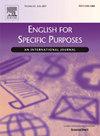TED演讲和TED动画中的学术公式:对学术词汇学习的见解
IF 2.7
1区 文学
Q1 LINGUISTICS
引用次数: 0
摘要
学术公式的知识对EAP学习者来说是必不可少的,因为这些序列无处不在,在学术语境中起着关键的话语作用。为了支持学术公式学习,关键是要确定提供频繁和多样化的接触这些公式的资源。本研究将TED演讲和TED动画作为潜在的教学资源,通过比较这些话语类型中学术公式表(AFL)项目与学术讲座的存在。结果表明,TED演讲和TED- ed动画都可以为学习者提供接触各种AFL项目的机会,其多样性可与学术讲座相媲美。TED演讲包含的AFL项目的密度和种类明显高于TED动画,突出了它们对学习学术公式的相对有用性。虽然TED-Ed动画总体上包含较少的公式,但它们具有与学术讲座相当的书面AFL项目的多样性,并且比其他学习资源(例如教科书)具有更高的密度和多样性,强调了它们作为补充资源的价值。本研究扩展了学术公式学习的资源范围,增强了对TED演讲和TED动画作为教育工具的理解,突出了它们独特的词汇特征和对学术英语教学的影响。本文章由计算机程序翻译,如有差异,请以英文原文为准。
Academic formulas in TED talks and TED-Ed animations: Insights for academic vocabulary learning
Knowledge of academic formulas is essential for EAP learners, as these sequences are pervasive and serve key discourse functions in academic contexts. To support academic formula learning, it is crucial to identify resources that provide frequent and diverse encounters with these formulas. This study examines TED talks and TED-Ed animations as potential pedagogical resources by comparing the presence of Academic Formulas List (AFL) items in these discourse types with academic lectures. The results indicate that both TED talks and TED-Ed animations can offer learners opportunities to encounter a wide variety of AFL items, with their diversity comparable to academic lectures. TED talks contain a significantly higher density and variety of AFL items than TED-Ed animations, highlighting their relative usefulness for learning academic formulas. While TED-Ed animations contain fewer formulas overall, they feature a comparable variety of written AFL items to academic lectures and a higher density and variety of academic formulas than other learning resources (e.g., textbooks), emphasizing their value as supplementary resources. This study expands the range of resources available for academic formula learning and enhances the understanding of TED talks and TED-Ed animations as educational tools, highlighting their distinct lexical characteristics and implications for academic English instruction.
求助全文
通过发布文献求助,成功后即可免费获取论文全文。
去求助
来源期刊

English for Specific Purposes
LINGUISTICS-
CiteScore
5.70
自引率
8.00%
发文量
41
审稿时长
62 days
期刊介绍:
English For Specific Purposes is an international peer-reviewed journal that welcomes submissions from across the world. Authors are encouraged to submit articles and research/discussion notes on topics relevant to the teaching and learning of discourse for specific communities: academic, occupational, or otherwise specialized. Topics such as the following may be treated from the perspective of English for specific purposes: second language acquisition in specialized contexts, needs assessment, curriculum development and evaluation, materials preparation, discourse analysis, descriptions of specialized varieties of English.
 求助内容:
求助内容: 应助结果提醒方式:
应助结果提醒方式:


